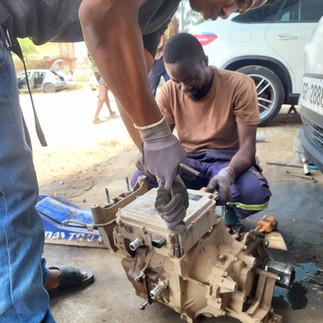Closing a chapter: BOOST’s journey of skills, jobs, and empowerment across Africa
- Thamires Pecis

- Oct 20, 2025
- 4 min read
BOOST is, above all, about people. Professionals landing their first jobs, women breaking barriers in a male-dominated field, and universities opening new doors for future generations. As the project comes to a close, what remains are not just numbers, but lives transformed and skills that will keep growing.
BOOST (Boosting e-Mobility Jobs in Africa), led by UEMI and GIZ, was implemented in Rwanda, Ghana, and Morocco to connect for over nearly two years companies, universities, and governments with the mission to build a workforce ready for the future.

Rwanda: exceeding expectations
In Rwanda, the results went far beyond what was planned. A total of 288 people were trained, almost three times the initial goal of 100. The training programmes combined intensive courses, practical workshops, vocational tracks, and internships in leading companies such as Ampersand, BasiGo, Kabisa, GuraRide, Feru Energy, The Ride, and I&K.
“Participating in the BOOST Project has been a transformative experience,” said Eugene Nzabonimpa, part of the BOOST Rwanda team.
“By engaging local companies and empowering University of Rwanda and TVET graduates through training and internships, we’ve witnessed how practical skills development can drive real job creation in e-mobility and urban transportation. The project built strong partnerships between academia and industry, linking graduates to meaningful opportunities in the e-mobility job market.”
More than 215 green jobs were created across different areas of e-mobility. One of the highlights was the Tinyuka Taxi Moto programme, which supported 49 women to become electric moto-taxi drivers through a rent-to-own model. By increasing their income by about 80%, these women gained not only financial independence but also recognition in a field traditionally led by men.
“The training was a great learning experience that opened my eyes to a side of transportation some people don’t often think about, such as e-mobility,” said Sugira Rwamurangwa Anthea, one of the participants. “What I learned really inspired me, and now I strongly encourage others to consider using electric vehicles and motorcycles as a better and more eco-friendly way to move around.”
BOOST also strengthened connections between universities and government. The course “The Role of E-Mobility in Sustainable Urban Transport: The Case of Kigali” trained 100 participants, all certified. Over 200 people received certificates recognised by industry partners, significantly improving their employability.
Training pathways included electric bicycle technicians, young people working in last-mile delivery using e-cargo bikes, and bike-taxi cooperatives supported by the City of Kigali. These initiatives didn’t just train professionals, they also sparked new microbusinesses and business models, from e-cargo delivery services to sustainable transport cooperatives.
Ghana: turning skills into jobs
In Ghana, BOOST built a strong ecosystem of opportunities in partnership with SolarTaxi, Wahu Mobility, SmartWatt, Drive EV, Nastech, Zerosol, and EcoWheels Innovations. The project supported 245 young people and women through training programmes, resulting in 186 new jobs created.
Inclusion was at the centre: 37% of participants were women and 61% were youth. Many roles were technical, from electric vehicle maintenance and assembly to fleet management and charging operations. Internships often evolved into permanent positions, creating long-term impact.
To secure this legacy, BOOST signed agreements with AAMUSTED and KNUST universities, which have now integrated e-mobility modules directly into their curricula. This ensures that, even after the project ends, students will continue to access e-mobility knowledg, extending BOOST’s reach and continuity.
Morocco: creating pathways for the future
In Morocco, BOOST strengthened the e-mobility sector through partnerships with POGO, TRACX, Voltamotors, and EM Solutions, which opened internships and job opportunities for young professionals in technical and engineering fields.
37 young people took part in practical internships, many of which turned into permanent roles across areas like vehicle maintenance, battery management, and charging infrastructure. In addition, 278 people completed online trainings, of which 32% were women and 95% youth.
These achievements were supported by partnerships with UM6P, UCA, and Green Energy Park, which have now embedded e-mobility and renewable energy content in their programmes. This integration ensures that BOOST’s results live on in the education system, preparing future generations for the growing sector.

A shared legacy
Across Rwanda, Ghana, and Morocco, BOOST created hundreds of jobs and built lasting bridges between universities, businesses, and governments. The project helped shift gender dynamics in a male-dominated sector and positioned young professionals at the forefront of the energy transition.
Its legacy also lives in the resources developed, from online courses and teaching repositories to business guides and policy studies, all designed to support the sector’s expansion. Universities are now incorporating e-mobility modules into their curricula, while companies have adopted new training models inspired by the project.
BOOST proved that when people have access to the right tools and opportunities, they can drive lasting change.This chapter may be closing, but its impact is only beginning, in the lives of the young professionals who found jobs, the women who gained independence, and the institutions that will continue to carry forward the capacities built through the project.
















Comments